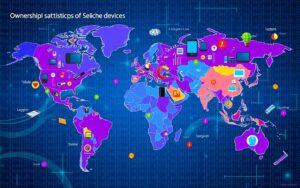Current Trends in Information Technology
The world of Information Technology changes quickly, thanks to new tech breakthroughs. In 2023, the focus is mainly on artificial intelligence, especially generative AI. Experts believe it will leap from under 5% use in businesses now to more than 80% by 2026. This change means IT experts must keep learning about new tech to stay ahead.
The global AI market is booming, with its value close to $208 billion in 2023. It’s expected to hit around $2 trillion by 2030. Generative AI plays a big part in this growth. It’s making waves beyond its own field, with 95% of global leaders saying it shapes enterprise intelligence. This shows how crucial it is for businesses to adopt new AI and tech trends.
Also, 5G and edge computing are getting more attention for their role in better connectivity and data handling. The edge computing sector is predicted to grow at an astonishing rate of 37.9% to 38.9% from 2023 to 2030. For IT professionals, it’s vital to understand these areas to keep their skills relevant in the future.
The Rise of Artificial Intelligence in IT
The field of information technology is being massively changed by Artificial Intelligence (AI). This change isn’t just making operations more efficient but is also sparking new ideas in many areas. As more companies start using AI, we can see big changes happening.
Generative AI: Transforming Industries
Generative AI is quickly becoming a key player in reshaping different fields. It grabbed the spotlight in 2022, and its impact in the business realm grew by 2023. It’s enabling the creation of complex texts, images, and sounds, boosting productivity and offering new ways to solve problems.
Finance, healthcare, and the arts are just some areas making the most of generative AI. Studies suggest that by 2026, more than 80% of firms will use these techs in their workflows. Thanks to open-source projects like Meta’s LLaMA, even small companies can now use advanced AI affordably. This move towards smaller, more affordable AI models is set to continue as they provide good results without needing a lot of computing power.
Ethical Considerations in AI Development
With AI becoming more common, thinking about its ethical impact is crucial. Concerns like data privacy and misinformation are urgent issues. As AI keeps growing, making sure there are enough rules to deal with these matters is essential. Setting ethical standards for AI is key, especially for being open about how AI systems make decisions.
Talking about explainable AI shows how important it is to understand AI decisions. As things change, the focus on using AI responsibly will become more important. This will affect how companies use AI. Working together to make AI that is new, ethical, and clear is important. Joining in on talks about these topics is crucial for a future where AI technology is sustainable.
For more details on the latest in AI, click here.
What are Current Trends in Information Technology
The IT world is quickly changing, showcasing new trends. It’s key for IT experts to keep up with these developments. This helps them match their skills with what’s in demand today.
The Importance of Keeping Up with Emerging Technologies
Emerging tech needs our constant focus for professional growth in IT. We’re seeing big moves in blockchain, artificial intelligence (AI), and edge computing. IT experts need to learn about these to stay ahead.
- AI is still leading in tech advancements.
- Generative AI and explainable AI are having a big impact in various fields.
- IoT gadgets are everywhere now, thanks to better 5G service.
- Edge computing is becoming more popular in sectors like healthcare and manufacturing.
- Machine learning is changing how we handle data with AutoML.
Continuous Learning for IT Professionals
For IT workers, constant learning is key to staying relevant. The tech world keeps bringing out new tools and methods. To keep up, they should pursue training, online classes, and seminars.
With the rise of quantum computing, the job market is evolving. New roles like Quantum Algorithm Developer are emerging. IT pros should dive into the latest tech knowledge.
If you’re into data privacy, check out new tech like homomorphic encryption. It lets us process data securely without giving away privacy. For more on privacy matters, read the privacy guidelines.
| Technology Trend | Impact | Industry |
|---|---|---|
| Artificial Intelligence | Market growth expected to increase by 20x by 2030. | All sectors |
| IoT | Expansion driven by 5G bandwidth. | Retail, manufacturing |
| Edge Computing | Enhances data processing speed and security. | Healthcare, logistics |
| Quantum Computing | Creates job opportunities and advances computation speed. | Finance, research |
| Blockchain | Generating significant business value across multiple sectors. | Finance, supply chain |
Staying updated with IT trends and continuous learning is vital for thriving in this dynamic field.
Adoption of 5G Technology
The arrival of 5G technology is changing the telecom industry greatly. It’s set to offer better connectivity and top network speeds. Right now, 62% of smartphones are 5G ready. It’s thought that by 2030, 85% of networks globally will support 5G. This quick move shows a big leap towards improving connectivity in many areas.
Enhanced Connectivity and Network Performance
5G is reshaping how industries work. Currently, 45% of networks can handle 5G, bringing fast internet to 200 million homes and businesses in North America. In the manufacturing world, 5G has boosted efficiency by 68%. It’s made healthcare services 45% faster, thanks to better network performance.
5G’s Role in Advancing IoT Applications
5G is vital for pushing forward IoT applications. Its high speed and low delay help in sending data instantly, crucial for smart cities and health devices. In the energy field, there’s a 40% improvement in managing grids with 5G. Plus, with 120 million 5G gadgets expected in the US by the year’s end, IoT ecosystems are set to perform much better.
Advancements in Quantum Computing
Quantum computing marks a major advancement in our tech capabilities. It opens doors to new breakthroughs in quantum technology. Many organisations are now exploring its potential. By 2023, IBM will introduce the Heron quantum processor with 133 qubits. The focus is on improving quality and connecting processors to enhance their power.
The goal is to build large quantum systems that can connect many qubits. This would help solve current problems with quantum computing. Companies are also working on ways to reduce errors, much like noise-cancelling in headphones.
New quantum communication methods will connect different tech. This will allow networks to expand across areas, boosting quantum computing’s reach. However, there are still hurdles like the short life of qubits and the challenge of scaling up.

Countries around the world are racing to excel in quantum computing. Already, 24 nations have set up quantum development programs. They plan to invest around US $40 billion in these initiatives.
The rise of quantum computing could threaten traditional online security. There’s a growing risk to our encryption systems. By 2026, there’s a significant chance these could be compromised. It’s crucial for organisations to invest in quantum research now. Merging quantum computing with AI could greatly improve how we analyse data.
Quantum computing is promising a future filled with incredible possibilities. Industries of all kinds could be transformed. For more insights on technology’s impact, visit this comprehensive resource.
Enhancements in Edge Computing
Edge computing is evolving fast and is key for businesses looking to boost performance. It meets the needs of modern apps. The rise in connected gadgets makes quick data processing vital. Edge computing processes data near its source. This change benefits various sectors by improving user experience and efficiency.
Low Latency Benefits for Various Industries
More organisations are using edge computing for its low latency perks. It allows for faster responses, crucial for real-time use like self-driving cars and smart factories. With more IoT devices used, the demand for quick data handling grows. Processing at the edge means data is handled faster, making systems reliable for important tasks.
Improved Data Security and Processing
In a time when data security is critical, edge computing offers big benefits. It decentralises data processing, lowering the risk of central data hacks. This is key in healthcare and finance. Better encryption and hardware safety features are coming. They will protect data better, whether stored or moving. This makes systems secure and lets them work well without always needing cloud connections.
Edge computing is making sectors more capable and secure. As companies adopt this tech, focus on efficient data handling and security will grow. This sets the stage for new apps that change industry norms.
| Key Benefits of Edge Computing | Description |
|---|---|
| Low Latency | Processes data near the source, enabling real-time responses in critical applications. |
| Data Security | Decentralisation reduces centralised breach points, improving overall security. |
| Bandwidth Optimisation | Minimises data transmission to central servers, reducing costs. |
| Operational Resilience | Ensures applications remain functional even during network interruptions. |
Conclusion
The world of IT is changing fast, making it key for professionals to stay adaptable. Huge strides in artificial intelligence, 5G, and edge computing show the bright future and tough challenges ahead. This summary shows how robotic process automation and the Internet of Things are not just trends. They’re changing how industries work, making things more efficient, and sparking new ideas.
5G is coming with speeds up to 20 Gbps and very low delay. This shows why IT experts must keep learning. As these techs grow, they’ll majorly impact many fields like healthcare and finance. Keeping up to date is crucial to use these new tools well and stay competitive in a digital world worth about $11.5 trillion.
In short, IT’s future is full of chances for those ready to keep learning and growing. By welcoming new changes brought by AI, quantum computing, and better connectivity, IT workers can lead in making the world more innovative and efficient.
FAQ
What is Generative AI and how is it transforming industries?
Generative AI can make realistic text, images, and audio. It boosts productivity and sparks new ways to solve problems. It’s making big changes in finance, healthcare, and the arts.
What are the main ethical considerations in AI development?
In AI development, we worry about keeping data private, owning ideas, and stopping false information. We must use AI carefully to avoid these problems. Making AI understandable is becoming important.
Why is it important for IT professionals to keep up with emerging technologies?
IT experts must stay current with new tech to match future job needs. This knowledge helps them keep businesses running smoothly. Being adaptable is key in the digital world.
How can IT professionals facilitate continuous learning?
IT workers can keep learning through training, online courses, and seminars. Adapting to new technologies is crucial to stay ahead.
What are the benefits of 5G technology for connectivity?
5G brings faster data, better coverage, and stable connections. It powers smart devices and reduces delay. This is great for transport and health sectors.
How is 5G technology advancing IoT applications?
Thanks to its high speeds, 5G is pushing IoT forward. It supports real-time data for smart cities and health devices. Autonomous cars also benefit, making them more reliable.
What advancements are being made in quantum computing?
Quantum computing is moving fast, with tech giants investing heavily. It could transform drug making, security, and simulations. Expect exciting developments by 2024 and beyond.
What are the low latency benefits of edge computing?
Edge computing cuts down delay by processing data nearby. It’s perfect for instant needs like smart factories and self-driving cars. It improves speed and how well systems work.
How does edge computing improve data security?
By spreading out data handling, edge computing makes data safer. This is vital for healthcare and banking info. It reduces the chances of data leaks and lets applications work offline.









